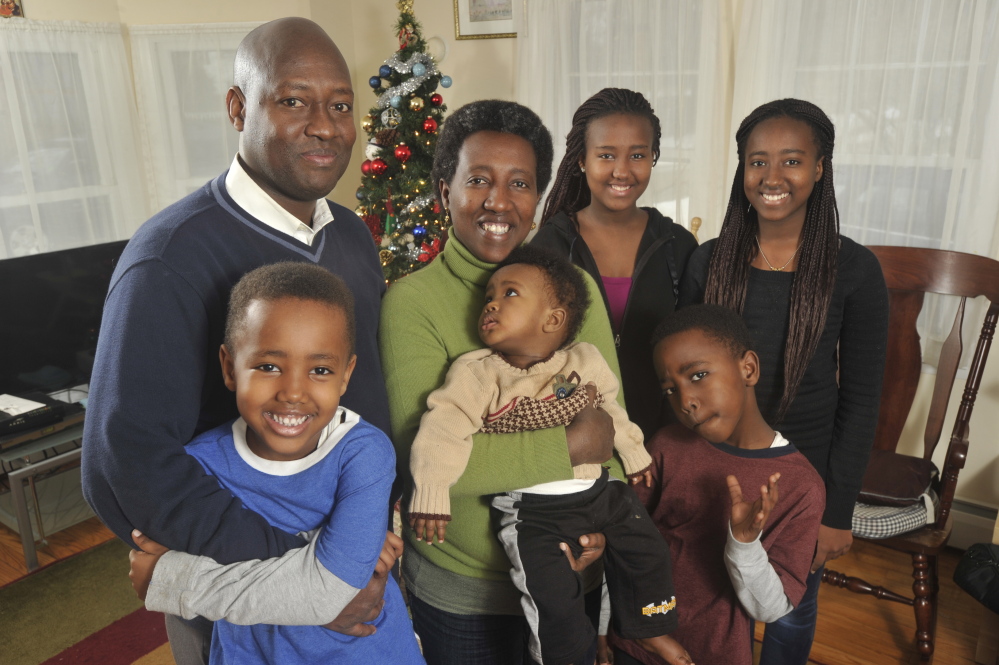GORHAM — Alain Bitariho thought about the difference between Christmas in the United States and Christmas in his home country of Burundi.
“The biggest thing is not having to worry whether my family is safe and secure,” Bitariho, 45, said Monday from his home in Gorham. “We can enjoy each other without fear.”
This year, for the first time in several years, Bitariho, his wife, Mia Ntahobari, 42, and their five children – Megan, 14; Nathalie, 12; Joseph, 7; Mathieu, 5 and Jacob, 9 months – will be together and celebrating a holiday that’s central to their Christian faith.
The family took a long road to get here. They are among a growing number of people who have fled war-torn central Africa and come to Maine seek asylum and a better life.
Asylum seekers are immigrants who come to this country, usually under duress, before receiving the proper paperwork. An estimated 500 have come to Greater Portland in 2013, an increase of least 200 since 2011. A rule change just proposed by Gov. Paul LePage would prevent asylum seekers like the Bitarihos from receiving General Assistance aid.
Technically, this is the family’s second Christmas in the U.S., but because they had reunited shortly before the holidays in 2012, last Christmas was something of an afterthought. This is the one they will celebrate.
Much has changed for them in the year since they were reunited. They are settled into a cozy home off Main Street in Gorham. The children are in the local schools. Mia, who has received her work visa, is employed as a certified nursing assistant at a nursing home. Alain, who has not officially been granted asylum and cannot work, spends most of his time with the family and volunteering with HopeGateWay, a United Methodist church in Portland.
“There are many troubles in our country,” Alain said. “It was so hard to leave, but also, it’s hard to watch the news and see the struggles still happening.”
Burundi is a small, landlocked African country bordered by the Democratic Republic of the Congo on the west and Tanzania on the east, with Rwanda on its northern border. The country is poor, with one of the lowest per capita GDPs in the world. For years, it was ravaged by civil war and government corruption, and its people were held back by a high rate of HIV/AIDS and limited access to public education.
The country is independent, trying to rebuild and assist other countries that are under siege by militants, but active opposition forces remain in Burundi and years of strife have caused economic ruin.
Mia left her native country first, in 2010. She had been working as a clinical and social psychiatrist, primarily helping rape victims. The government did not approve of the work that she and others were doing, so she left amid threats of violence. For weeks after she arrived in Portland, Mia stayed at a homeless shelter.
Alain, who had stayed behind with the children, joined his wife in Portland the next year. But their children could not join them right away. They stayed in Burundi for seven more months with their extended family while their parents tried to build a foundation for the family here.
Those months were the toughest for Alain and Mia. When they reunited as a family in the U.S. in December 2012, it was the first time in two years they had all been together.
The family has found a community through HopeGateWay, which has been welcoming central African immigrants for more than two years. Pastor Allen Ewing-Merrill said one-quarter to one-third of the congregants on any Sunday are African. Burundi, like most African countries, is more than 90 percent Christian.
“Faith is really central to their lives. It gives them strength and hope,” said Ewing-Merrill. “And for our church, it’s an incredible blessing. It’s been transformative, really.”
The Bitarihos have been particularly active in the church. They volunteer at community dinners. They assist other asylum seekers. Alain even translated a guidebook for the Hope House, a transitional home for asylum seekers, from English into French, a language spoken in most central African nations.
This week, the Bitarihos were like any other Maine family getting ready to celebrate Christmas. A tree stood in a corner of their living room, adorned with colored ornaments. A modest number of presents lay underneath it. The two school-age boys, Joseph and Mathieu, were rambunctious and eager to point them out. The two girls, Megan and Nathalie, were shy but polite.
They don’t have big plans for the holiday.
They planned to attend the 11 p.m. “Silent Night, Holy Night,” service at their church. They will probably stay at home on Christmas Day, open presents, cook a turkey and enjoy a family meal.
And be together.
Safe.
Eric Russell can be contacted at 791-6344 or at:
erussell@pressherald.com
Twitter: @PPHEricRussell
Send questions/comments to the editors.




Success. Please wait for the page to reload. If the page does not reload within 5 seconds, please refresh the page.
Enter your email and password to access comments.
Hi, to comment on stories you must . This profile is in addition to your subscription and website login.
Already have a commenting profile? .
Invalid username/password.
Please check your email to confirm and complete your registration.
Only subscribers are eligible to post comments. Please subscribe or login first for digital access. Here’s why.
Use the form below to reset your password. When you've submitted your account email, we will send an email with a reset code.